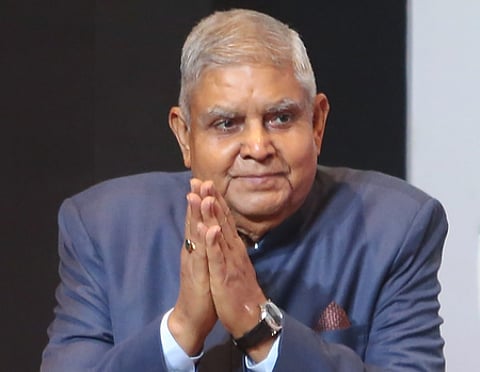Who is Jagdeep Dhankhar - the lawyer-turned-politician who resigned as India’s vice-president?
From Rajasthan to the corridors of power, Dhankhar’s journey spans law and politics

Jagdeep Dhankhar, who resigned as Vice-President of India this week citing health concerns, leaves behind a legacy marked by constitutional authority, political agility, and a career that bridged the worlds of law and public service.
The 74-year-old former Governor of West Bengal and senior lawyer stepped down from his post late Monday night. In a letter addressed to President Droupadi Murmu, Dhankhar wrote that he was resigning “to prioritise care for health” and in line with medical advice, as per Article 67(a) of the Constitution. His resignation has jolted India’s political circles and fuelled speculation about succession at the second-highest constitutional office.
Humble beginnings and academic brilliance
Born on May 18, 1951, in Kithana, a small village in Rajasthan’s Jhunjhunu district, Dhankhar grew up in a humble Jat farming family. His father, Gokal Chand, and mother, Kesari Devi, instilled in him a strong sense of discipline and ambition.
Dhankhar began his education at a government primary school in his village and later walked kilometres each day to attend middle school in nearby Ghardhana. His academic abilities earned him a full merit scholarship to Sainik School, Chittorgarh, in 1962. He completed his schooling with the Indian School Certificate (ISC) examination, recognised by Cambridge University.
He went on to earn a B.Sc. (Honours) in Physics from Maharaja’s College, Jaipur, and later pursued law, completing his LLB from the University of Rajasthan in 1979.
A distinguished legal career
Dhankhar began his legal practice in 1979, enrolling with the Bar Council of Rajasthan. Over the next four decades, he built a formidable legal career. In 1990, he was designated a Senior Advocate by the Rajasthan High Court and went on to argue cases at the Supreme Court and various High Courts across India.
He became known for his expertise in constitutional law, international commercial arbitration, and cases involving steel, coal, and mining sectors. He represented Haryana in the Sutlej River water dispute in 2016 and served as the President of the Rajasthan High Court Bar Association. At the time of his gubernatorial appointment in 2019, Dhankhar was the senior-most designated Senior Advocate in Rajasthan.
Political foray and party affiliations
Dhankhar’s entry into politics came in 1989, when he was elected as a Member of Parliament from Jhunjhunu, representing the Janata Dal. He served as Union Minister of State for Parliamentary Affairs in the short-lived Chandra Shekhar government in 1990. In 1993, he was elected to the Rajasthan Legislative Assembly from Kishangarh, Ajmer, and served until 1998.
After an unsuccessful run in 1991 on a Congress ticket, Dhankhar took a long hiatus from electoral politics. He joined the Bharatiya Janata Party (BJP) in 2003 and later headed its legal and law affairs cell in Rajasthan. Known for his sharp legal mind and ideological alignment with the BJP, he remained an influential figure behind the scenes.
Governor of West Bengal (2019–2022)
In July 2019, Dhankhar was appointed Governor of West Bengal, a position in which he gained national prominence. His tenure was marked by frequent clashes with the Trinamool Congress-led state government, particularly on issues of governance, federalism, and constitutional propriety. His assertive role as governor turned him into a polarising but high-profile figure, often making headlines for his strong statements and confrontational posture.
Vice-President of India (2022–2025)
In July 2022, the BJP-led NDA nominated Dhankhar for the post of Vice-President of India. He won the vice-presidential election held on August 6, 2022, by a significant margin, securing 528 out of 710 valid votes, defeating opposition candidate Margaret Alva.
Sworn in on August 11, 2022, Dhankhar also assumed the role of Chairman of the Rajya Sabha. His background in law and parliamentary affairs helped guide proceedings in the Upper House. Known for advocating economic reforms, OBC representation (particularly for the Jat community), and parliamentary discipline, Dhankhar was seen as a procedural stickler with a firm belief in institutional integrity.
Sudden resignation and health concerns
Despite recovering from angioplasty earlier in March 2025 and continuing to remain active, Dhankhar surprised many by tendering his resignation on July 21, 2025, just days after indicating he would complete his term until 2027.
In his resignation letter, he thanked President Droupadi Murmu, Prime Minister Narendra Modi, MPs, and ministers for their support and expressed pride in India’s “swift economic development and democratic transformation” during his tenure.
With the vice-president’s office now vacant, his responsibilities as Rajya Sabha chairman are expected to be temporarily handled by the deputy chairperson or a member designated by the president.
Personal life
Dhankhar married Dr Sudesh Dhankhar, a post-graduate in economics from Banasthali Vidyapeeth, in 1979. The couple has one daughter, Kamna. Dr Sudesh is known for her involvement in social work, organic farming, and child education.
Sign up for the Daily Briefing
Get the latest news and updates straight to your inbox




